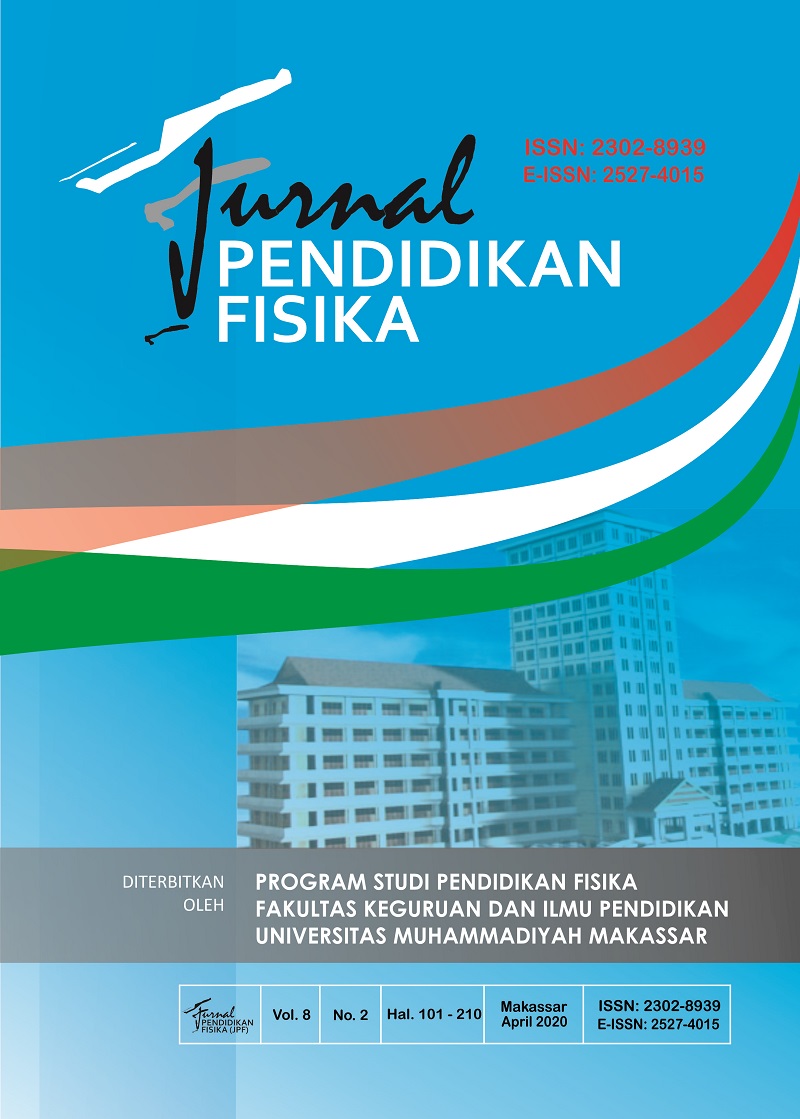Implementation of Scientific Approach in Physics Learning in Makassar City
DOI:
https://doi.org/10.26618/jpf.v8i2.3290Keywords:
Approach, Assessment, Implementation, Learning, Physics, ScientificAbstract
This research is a qualitative study that aims to uncover the implementation of scientific approaches and assessment systems in learning physics at senior high schools in Makassar. The research subjects consisted of 8 physics class XI teachers from 4 schools in Makassar City. The research data were obtained through questionnaires, documentation, observation, and interviews. Interviews aim to synchronize data obtained through questionnaires, observations and documentation. Based on the results of the study showed that, a scientific approach in learning physics by teachers has been implemented even though it has not been maximized. Likewise, authentic assessment in learning physics in aspects of knowledge and skills has been carried out well, but not yet in the attitude aspect. The cause of the lack of optimal is insufficient time, different abilities of students, the willingness of students to ask questions and seek help, responded accordingly, the number of learners is large, and the readiness is still inadequate.References
Kustijono, R. & Wiwin, E. 2014. Pandangan Guru terhadap Pelaksanaan Kurikulum 2013 dalam Pembelajaran Fisika SMK di Kota Surabaya. Jurnal Penelitian Fisika dan Aplikasinya (JPFA), 4(1), 1–14.
Maba, W. 2017. Teachers’ Perception on the Implementation of the Assessment Process in 2013 Curriculum. International Journal of Social Sciences and Humanities, 1(2).
Ernawati & Safitri. 2017. Analisis Kesulitan Guru dalam Merancang Rencana Pelaksanaan Pembelajaran Mata Pelajaran Fisika Berdasarkan Kurikulum 2013 di Kota Banda Aceh. Jurnal Pendidikan Sains Indonesia (Indonesian Journal of Science Education), 5(2).
Rusman. 2012. Kurikulum & Pembelajaran. Jakarta: PT Raja Grafindo Persada.
Sudarwan. 2013. Pendekatan-Pendekatan Ilmiah dalam Pembelajaran. Jakarta: Workshop Kurikulum.
McCollum, S. 2009. Character Education: Managing Conflict Resolution. New York: Chelsea House.
Faturrohman, Muhammad. 2015. Paradigma Pembelajaran Kurikulum 2013. Startegi Alternatif Pembelajaran di Era Global. Yogjakarta: Kalimedia.
Flores, F., Lopez, A., Gallegos, L., & Barojas, J. 2000. Transforming Science and Learning Concepts of Physics Teachers. International Journal of Science Education, 22(2), 197-208.
Machin, A. 2014. Implementasi Pendekatan Saintifik, penanaman karakter dan konservasi pada pembelajaran materi pertumbuhan. Jurnal Pendidikan IPA Indonesia JPII 3.1(1): 28-35.
Retnawati, H., Hadi, S., & Nugraha, A. C. 2016. Vocational High School Teachers’ Difficulties in Implementing the Assessment in Curriculum 2013 in Yogyakarta Province of Indonesia. International Journal of Instruction, 9(1).
Anonim, 2016. Permendikbud No. 23 Tahun 2016 Tentang Standar Penilaian dan Pendidikan. Jakarta.
Kunandar. 2015. Penilaian Autentik. Jakarta: Rajawali Pers.
Muzamiroh, M.L. Kupas Tuntas Kurikulum 2013. Surabaya: Kata Pena.
Majid, A. 2014. Pembelajaran Tematik Terpadu. Bandung: PT Remaja Rosdakarya
Frey, S. & Allen. 2012. Defining Authentic Classroom Assessment Research & Evaluation. A peer-reviewed electronic journal, 17(2):1-18.
Miles, M.B., & A.M. Huberman, J. Saldaña, 2014, Qualitative Data Analysis: a Methods Sourcebook, Third Edition, SAGE Publications Inc, ISBN 978-1-4522-5787-7, Printed in the United States of America.
Downloads
Published
Issue
Section
License
Copyright:
Authors who publish with this journal agree to the following terms:
1. Authors retain copyright and grant the journal right of first publication with the work simultaneously licensed under a Creative Commons Attribution-ShareAlike 4.0 International License that allows others to share the work with an acknowledgement of the work's authorship and initial publication in this journal.
2. Authors are able to enter into separate, additional contractual arrangements for the non-exclusive distribution of the journal's published version of the work (e.g., post it to an institutional repository or publish it in a book), with an acknowledgement of its initial publication in this journal.
3. Authors are permitted and encouraged to post their work online (e.g., in institutional repositories or on their website) prior to and during the submission process, as it can lead to productive exchanges, as well as earlier and greater citation of published work.
Licence:
Authors are free to:
1. Share: Copy and redistribute the material in any medium or format
2. Adapt: Remix, transform, and build upon the material for any purpose, even commercially.
The licensor cannot revoke these freedoms as long as the authors follow the license terms, which include the following:
1. Attribution: You must give appropriate credit, provide a link to the license, and indicate if changes were made. You may do so in any reasonable manner, but not in any way that suggests the licensor endorses you or your use.
2. ShareAlike: If you remix, transform, or build upon the material, you must distribute your contributions under the same license as the original.
3. No additional restrictions: You may not apply legal terms or technological measures that legally restrict others from doing anything the license permits.
Jurnal Pendidikan Fisika is licensed under a Creative Commons Attribution-ShareAlike 4.0 International License.

